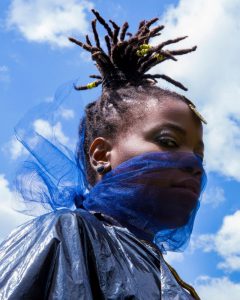Nothing on Québec’s music scene sounds like Higher, Malika Tirolien’s sophomore album. Alongside renowned NYC composer Michael League (of Grammy-winning jazz-fusion band Snarky Puppy), the singer-songwriter lays the foundations of her “high soul,” an airy mix of soul, jazz, R&B, and hip-hop.
 “If by ‘clash’ you mean ‘a fresh sound that we rarely hear here,’ then you’re absolutely right. It’s exactly what we were aiming for,” says Tirolien when we point out the unique character of her project. “With ‘high soul,’ we wanted to create an original and unique sound that was ours.”
“If by ‘clash’ you mean ‘a fresh sound that we rarely hear here,’ then you’re absolutely right. It’s exactly what we were aiming for,” says Tirolien when we point out the unique character of her project. “With ‘high soul,’ we wanted to create an original and unique sound that was ours.”
Despite its lack of roots in Québecois musical culture, this hybrid genre has deeply American sources, as evidenced by its similarity to the work of Kamasi Washington, Thundercat, Erykah Badu, and other artists who cross Black music with more ambient and psychedelic overtones.
In the studio, “high soul” is crafted with a great deal of precision. “We placed the microphones and instruments in a specific way,” says Tirolien, also a member of the band Bokanté, as is League, her New York accomplice. “Michael decided to use only three mics to record the drums, which yields a more ‘oval’ and enveloping sound. We also recorded everything at a frequency of 432 Hz, which gives a more natural sound than the 440 Hz typical of pop music. That frequency is supposed to bring us into a state of relaxation, and connection with nature. It’s quite an esoteric belief – you either believe in it or you don’t – but to me, it fit with the album concept.”
The second part of a four-elements-themed quartet of releases, Higher represents the air. Hence its ambient and spiritual themes, flowing logically from the more down-to-earth, rooted concept of Sur la voie ensoleillée, her first album.
This time around, the Guadeloupe-born singer-songwriter invites us on “a psychedelic trip from anger to forgiveness.” The first three songs are a clear warning that this will be an intensely emotional trip. “It’s a suite in three movements,” she says. “First, on ‘No Mercy,’ you have anger, fire, and the urge for revenge. It’s important to go through those feelings if you wish to let go of them, instead of repressing them. Then, once you’ve dealt with all that, you can think about changing. That’s ‘Change Your Life.’ Finally, on ‘Better,’ you’re in the realm of my life’s mantra: mindful thinking. I consciously choose my thoughts so that they remain positive. The idea is not to be toxically positive, but to remain in control of our thoughts when things aren’t going so well.”
And although Higher is an “aerial” album, Tirolien still tackles very real, earth-bound topics. “Prière” re-visits a poem written by her grandfather, Guy Tirolien, challenging head-on the the falsified (and very white) history that’s been perpetuated for centuries in America. “It’s one of the direst consequences of colonization,” she says. “It should be a matter of fact for Black people to learn and know where we’re from. We must be proud of our history,” says the adoptive Montréaler.
Elsewhere, on “Sisters,” she advocates for greater solidarity between women. “Women have competed against each other for a very long time,” says Tirolien. “Reading anthropological writings that dealt with the subject, I understood that it dated back to the time when we had to try to please men, and compete to be protected by the strongest man. It’s in our cultural DNA, but we don’t need it anymore! I’m happy to see that, lately, there’s slightly more unity among women, especially thanks to the mobilization behind the #metoo movement. It’s important to stick together, ’cause we still have a lot of challenges to face.”
 The creation of the 11 songs on Higher required a full three years. In their New York studio, Tirolien and League fine-tuned and arranged their musical direction for two of those three years. It was a long-haul endeavour that allowed the artist to learn a lot about herself. “I tend to be a perfectionist and to focus too much on the result rather than the process,” says Tirolien. “I sometimes have a hard time enjoying the present. Thankfully, Michael is there to pull me in the opposite direction.”
The creation of the 11 songs on Higher required a full three years. In their New York studio, Tirolien and League fine-tuned and arranged their musical direction for two of those three years. It was a long-haul endeavour that allowed the artist to learn a lot about herself. “I tend to be a perfectionist and to focus too much on the result rather than the process,” says Tirolien. “I sometimes have a hard time enjoying the present. Thankfully, Michael is there to pull me in the opposite direction.”
Nearly a decade after meeting in a Montréal venue, where she was opening for his band Snarky Puppy, Tirolien says she’s especially happy to have found in Michael League a musician who complements her so well and makes her evolve so much.
Last year, a Grammy nomination for Bokanté (for Best World Album) reminded Tirolien of the importance of going international rather, than limiting themselves to the Québec market. “A lot of change has to happen in Québec for R&B/soul music to be truly accepted,” she says. “Just trying to find a label for myself here showed me how much work remains to be done. I was told, word for word, that my music would never work,” she laments, noting that there’s still no Québec musical gala that rewards her musical genre. “So, while we wait for things to change, I still want to produce myself. I have no choice but to aim higher.”